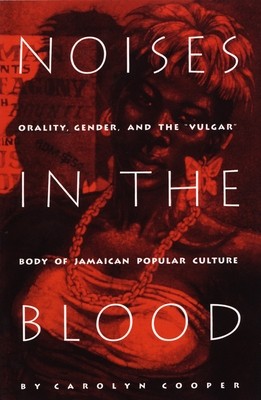
- We will send in 10–14 business days.
- Author: Carolyn Cooper
- Publisher: Duke University Press
- ISBN-10: 0822315955
- ISBN-13: 9780822315957
- Format: 16 x 23.7 x 1.5 cm, minkšti viršeliai
- Language: English
- SAVE -10% with code: EXTRA
Reviews
Description
The language of Jamaican popular culture--its folklore, idioms, music, poetry, song--even when written is based on a tradition of sound, an orality that has often been denigrated as not worthy of serious study. In Noises in the Blood, Carolyn Cooper critically examines the dismissed discourse of Jamaica's vibrant popular culture and reclaims these cultural forms, both oral and textual, from an undeserved neglect.
Cooper's exploration of Jamaican popular culture covers a wide range of topics, including Bob Marley's lyrics, the performance poetry of Louise Bennett, Mikey Smith, and Jean Binta Breeze, Michael Thelwell's novelization of The Harder They Come, the Sistren Theater Collective's Lionheart Gal, and the vitality of the Jamaican DJ culture. Her analysis of this cultural "noise" conveys the powerful and evocative content of these writers and performers and emphasizes their contribution to an undervalued Caribbean identity. Making the connection between this orality, the feminized Jamaican "mother tongue," and the characterization of this culture as low or coarse or vulgar, she incorporates issues of gender into her postcolonial perspective. Cooper powerfully argues that these contemporary vernacular forms must be recognized as genuine expressions of Jamaican culture and as expressions of resistance to marginalization, racism, and sexism.
With its focus on the continuum of oral/textual performance in Jamaican culture, Noises in the Blood, vividly and stylishly written, offers a distinctive approach to Caribbean cultural studies.
EXTRA 10 % discount with code: EXTRA
The promotion ends in 22d.01:29:25
The discount code is valid when purchasing from 10 €. Discounts do not stack.
- Author: Carolyn Cooper
- Publisher: Duke University Press
- ISBN-10: 0822315955
- ISBN-13: 9780822315957
- Format: 16 x 23.7 x 1.5 cm, minkšti viršeliai
- Language: English English
The language of Jamaican popular culture--its folklore, idioms, music, poetry, song--even when written is based on a tradition of sound, an orality that has often been denigrated as not worthy of serious study. In Noises in the Blood, Carolyn Cooper critically examines the dismissed discourse of Jamaica's vibrant popular culture and reclaims these cultural forms, both oral and textual, from an undeserved neglect.
Cooper's exploration of Jamaican popular culture covers a wide range of topics, including Bob Marley's lyrics, the performance poetry of Louise Bennett, Mikey Smith, and Jean Binta Breeze, Michael Thelwell's novelization of The Harder They Come, the Sistren Theater Collective's Lionheart Gal, and the vitality of the Jamaican DJ culture. Her analysis of this cultural "noise" conveys the powerful and evocative content of these writers and performers and emphasizes their contribution to an undervalued Caribbean identity. Making the connection between this orality, the feminized Jamaican "mother tongue," and the characterization of this culture as low or coarse or vulgar, she incorporates issues of gender into her postcolonial perspective. Cooper powerfully argues that these contemporary vernacular forms must be recognized as genuine expressions of Jamaican culture and as expressions of resistance to marginalization, racism, and sexism.
With its focus on the continuum of oral/textual performance in Jamaican culture, Noises in the Blood, vividly and stylishly written, offers a distinctive approach to Caribbean cultural studies.


Reviews